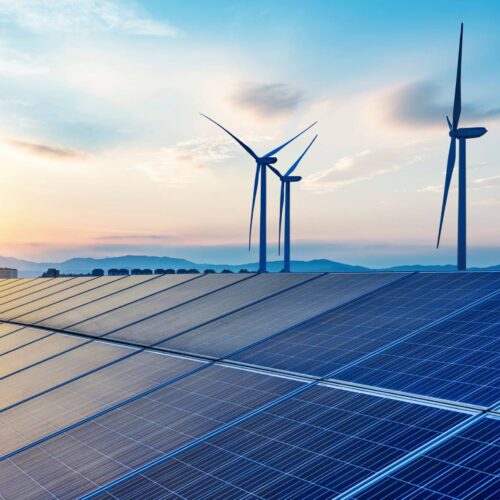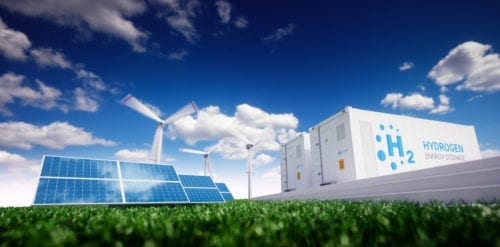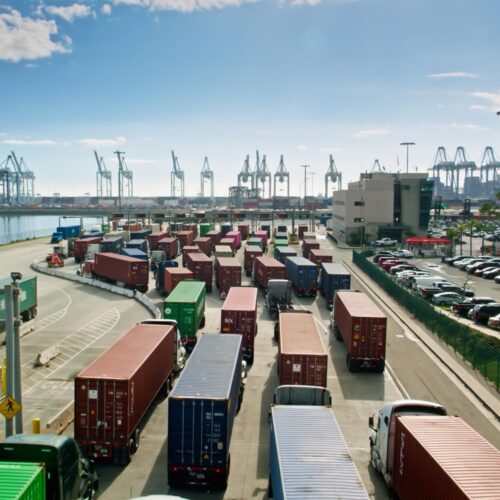California is a national leader in climate action with state mandates to achieve net zero emissions by 2045. Yet, California is the third largest industrial emitter in the United States, driven by the state’s refineries, heavy duty trucks, airports, and ports. In 2022, industrial facilities in California released more than 80 million metric tons CO2, 6 percent of all industrial emissions in the United States. In Southern California, our team works on heavy transportation and ports decarbonization, cement plant decarbonization, and industrial electrification.

Clean Industrial Hubs
Tackling Emissions in the Hard-to-Abate Sectors
Heavy industry and transport, which include cement, steel, aluminum, chemicals, aviation, shipping, and trucking, account for 23 percent of US greenhouse gas emissions and 30 percent of global greenhouse gas emissions. Meeting international decarbonization targets requires building more than 700 net-zero industrial projects by 2030 and purchasing 7 million zero-emissions trucks by 2030. Most of these projects will occur in regional industrial hubs where the physical, social, regulatory and economic infrastructure is in place to support rapid scale up. However, while hundreds of projects have been announced since 2022, as of April 2024 only 68 net-zero aligned plants are online, and another 42 projects have reached a final investment decision (“FID”). That means there are only five years left for 600 industrial decarbonization projects to be built.
Clean Industrial Hubs – A Regional Approach
That’s why RMI and Mission Possible Partnership (MPP), in collaboration with the Bezos Earth Fund, are working to create clean industrial hubs. Clean industrial hubs bring together project developers, policymakers, financial institutions, and community-based organizations to support regional clusters of industrial decarbonization projects.
Our regional-based approach to industrial decarbonization brings together industrial assets with social infrastructure – a hub – leveraging first-of-a-kind and other cutting-edge projects to achieve economies of scale and tipping points for decarbonization. Our hubs support model concentrates efforts in a defined geographical region through a two-pronged approach of (1) supporting decarbonization projects combined with (2) building an overall ecosystem of subnational policy, finance, infrastructure, and community engagement to improve outcomes and accelerate progress.
A hubs approach ensures replicability of projects at sufficient scale and provides a framework for similar interconnected initiatives in future and additional geographies. The approach also ensures focused attention from regulators, communities, and broader civil society on the coordinated development of individual projects needed to make a hub successful.
We’re starting in California and the Texas Gulf Coast
RMI and MPP, in collaboration with the Bezos Earth Fund, supported the acceleration of clean industrial hub development in Southern California and the Texas Gulf Coast.
Texas is the number one industrial emitter in the United States. In fact, in 2022, industrial facilities in Texas released more than 330 million metric tons CO2, 23 percent of all industrial emissions in the United States. The good news is, Texas also home to the majority of proposed industrial decarbonization and clean fuels development in the United States. To help heavy industries in Texas decarbonize, RMI and MPP analyzed future decarbonization pathways for heavy industry and the impacts on the electric grid from industrial electrification. Our work also focused on production and adoption of clean hydrogen and its derivatives to enable decarbonization in the shipping, steel, and aviation sectors.
Developing Enabling Ecosystems for Industrial Decarbonization

Policy
RMI leverages its extensive experience at both state and federal levels to study the impacts of policy and regulatory environments on industrial decarbonization projects. Our policy team has experience developing tools for project developers to evaluate available incentives across a wide variety of state and federal programs, as well as experience evaluating and identifying areas for potential improvement of industrial facility permitting and midstream carbon dioxide and hydrogen infrastructure across both Texas and California. The team contributes its findings via thought leadership, convenings and support to other programs within RMI.

Finance
RMI works with financial institutions and project sponsors to reduce the cost of capital for first-of-a-kind clean industrial projects, with an initial focus on project finance for hydrogen in the US Gulf Coast. Our work involves 1) increasing the supply of capital by widening and deepening investor engagement in the hydrogen market and 2) increasing demand for capital by sharing insights from financial institutions with project sponsors to improve asset-level bankability. Our team conducts bespoke research, facilitates multi-stakeholder convenings, and runs "project finance roadshows.”

Community Engagement
The Community Engagement team leads bespoke capacity-building trainings and workshops on strategies and best practices to embed equity and inclusive, two-way community engagement in decarbonization efforts by clean energy and infrastructure project developers. Our experts have authored innovative analytical tools and thought leadership to advance best practices and learnings from recent energy and industrial projects for advancing responsive and meaningful community benefits plans and agreements. The Community Engagement team also facilitates multi-stakeholder convenings for meaningful, inclusive engagement with community-based organizations (CBOs), frontline and fence-line communities, Tribal entities, labor groups, and low-income, BIPOC communities that have been disproportionately overburdened by legacy pollution and historic underinvestment.

Industrial Electrification
As a prominent lever for industrial decarbonization, electrification of industrial facilities plays a large part in RMI’s strategy for achieving emissions reductions across facilities ranging from port terminals and steelmaking facilities to buildings and transport. Our teams work cross-functionally with RMI’s other programs to consider clean energy availability needed for increased power baseloads associated with decarbonization of heavy industry and the broader regional economy.

Midstream Infrastructure (Pipelines, Transmission)
RMI is assessing the regulatory and built infrastructure landscapes of hydrogen and carbon dioxide midstream networks across the western and Gulf Coast regions of the United States for demand optimization. Our teams have mapped regulatory requirements, potential production and demand centers, and proposed infrastructure to enable hubs connectivity within and between regions.

First-of-a-Kind and Next-of-a-Kind Project Support
RMI works with project developers to catalyze ambitious industrial decarbonization projects reaching a final investment decision (FID). Our work focuses on reducing emissions from aviation, shipping, trucking, cement, and steel by scaling clean hydrogen, e-methanol, e-ammonia, SAF, and electrification. Our team supports project developers with techno-economic analysis, decarbonization pathways modeling, stakeholder convening, policy analysis, and financial modeling.
Tools
Look up federal and state incentives by industrial sector, type of incentive, location, and other features.
Creates insightful visualizations of stakeholder relationships and power dynamics for projects in all sectors, communities, and regions.
Global map tracking announced industrial decarbonization projects and developer progress toward FID.
Resources (Blogs, Videos, and Articles)
RMI is developing resources including blogs, videos, and articles to support project developers, policymakers, financial institutions, and community-based organizations advance industrial decarbonization projects.
California Dreamin’ on Earth Day
Last month on Earth Day, RMI, Mission Possible Partnership, and the Bezos Earth Fund gathered project developers, local policy makers, NGOs, and financial institutions in downtown Los Angeles to celebrate progress and take stock of the journey ahead to decarbonize industry and heavy transportation in California.
In Houston, We Have a Solution
Clean Industrial Hubs can help transform industrial centers worldwide.
Consult, Communicate, Collaborate
A checklist of 10 universal best practices and lessons to derisk energy and infrastructure project deployment.
Mapping the Path to Industrial Decarbonization
Heavy Industry and transport are responsible for nearly 30 percent of global carbon emissions, which is why bringing clean solutions to these industries is a must if we are to avoid the worst effects of climate change.
S.A.M. Tool: Learnings from the Beta Launch of RMI’s Stakeholder Analysis and Mapping Tool
Enter S.A.M. – short for stakeholder analysis and mapping – a digital tool that can create clear visualizations of all kinds of stakeholder landscapes.
How Electric Truck Fleets Can Save Money with Smarter Charging, Solar Power, and Batteries
Managed charging and distributed energy resources can save fleets up to 30 percent in electricity bills while reducing the time for grid connections.
What Other States Can Learn from California’s Journey to 150,000 EV Chargers
New RMI analysis explores California’s successes and challenges in its efforts to reform permitting processes for truck depots.
How to Prepare the Grid for Electric Medium- and Heavy-Duty Trucks: Lessons from Los Angeles
New data shows how fleets, utilities, local government, and charging providers can prepare the grid for increased power demand from electric trucks.
Easing the Permitting Process for Clean Industrial Projects in California
The industrial permitting process in California remains long and complicated. This memo outlines key challenges and solutions.
Four Ways to Jump-Start Clean Hydrogen Finance in 2025
A “hydrogen finance roadshow” highlighted five expectation gaps between developers and financial institutions — as well as four market-based ways to bridge them.
To Connect or Not to Connect: Demystifying Hydrogen Power Procurement Options, Risks, and Opportunities
As the deadline for final tax credit guidance approaches, the real work of project development begins
Capturing the Benefits of Industrial Decarbonization for Houston and Beyond
Understanding and quantifying the economic growth and emissions reduction benefits of industrial decarbonization to the Houston region.
Unraveling Willingness to Pay for Sustainable Aviation Fuel
A recent RMI survey shows airlines, logistics service providers, and corporate customers are willing to pay a green premium for SAF and SAFc and express preference for shorter contracts and waste-based feedstock.
Webinar – Tools for the Energy Transition: Project Development Resources for Heavy Industry
RMI’s webinar uncovers current trends and challenges in the industrial decarbonization space, describes our suite of resources to address some of the biggest challenges to technology implementers and explains how they can be used by project developers and startups to reach commercial deployment and final investment decision (FID) more quickly.
The Time Is Now for Zero-Emissions Cargo Handling Equipment at America’s Busiest Cargo Ports
The Ports of Los Angeles and Long Beach handle nearly 40 percent of US shipping container traffic; decarbonizing the equipment that handles these containers needs to begin now.
The Case for Placing Drayage Truck Chargers Away from Ports
Installing drayage truck chargers further away from ports can benefit fleets’ bottom line and operations, avoid grid bottlenecks, and reduce port congestion.
Overcoming Three Finance Dilemmas for US SAF Producers in 2024
According to project finance experts, US-based sustainable aviation fuel (SAF) producers will face three main dilemmas when financing commercial-scale projects in 2024: what feedstock to use, whether to get government loan guarantees, and how to de-risk operations.
Webinar – Providing Truck Charging Solutions in Southern California
Join RMI for a webinar on Providing Truck Charging Solutions in Southern California. On the webinar, you’ll hear the latest research from experts at RMI alongside real-world examples of deployment from the North American Council for Freight Efficiency (NACFE), Zeem, and BGIS.
Delivering Equitable and Meaningful Community Benefits via Clean Hydrogen Hubs
Case studies and best practices from advising developers of the DOE’s $7 billion Regional Clean H2Hubs program, plus lessons for future clean energy projects.
Webinar: Centering Equity and Community Engagement in Regional Clean Hydrogen Hubs
RMI explores the findings of our latest report Delivering Equitable and Meaningful Community Benefits via Clean Hydrogen Hubs in this webinar.
Stacking Rules, Bonus Credits, and the Future Industrial Markets the IRA Aims to Create
Understanding the goals behind the Inflation Reduction Act’s industrial tax credit rules is essential to maximizing their impact, both at the firm and the market level.
Five Lessons for Industrial Project Finance from H2 Green Steel
A project finance template is taking shape in Swedish steelmaking that could scale to clean industrial hubs around the world.
Webinar: Explaining the Hydrogen Tax Credit Rules: A First Look With RMI
The US Department of the Treasury issued guidance on the federal hydrogen tax credit 45V on December 22, 2023, and RMI hosts this webinar analyzing the guidance and its overarching implications for the larger clean hydrogen industry.
Three Federal Funding Pools Every Industrial Project Developer Should Know About
Heavy industry represents 30 percent of US CO2 emissions. And while decarbonizing industry is difficult, three exciting industrial developments are now taking place in the United States that will help speed progress.
External Resources
How clean industrial developers can overcome five project finance barriers
New cleantech projects across the U.S. will rely on project finance — but getting access to private capital requires checking some boxes.
How to unblock project finance for US clean hydrogen
To accelerate project bankability in the nascent sector, banks must engage with sponsors earlier and more deeply than normal.
Unlocking Green Industrial Growth
Key Insights from US Clean Industrial Hubs
Partners


Ecology energy solution. Power to gas concept. Hydrogen energy storage with renewable energy sources - photovoltaic and wind turbine power plant in a fresh nature. 3d rendering.






